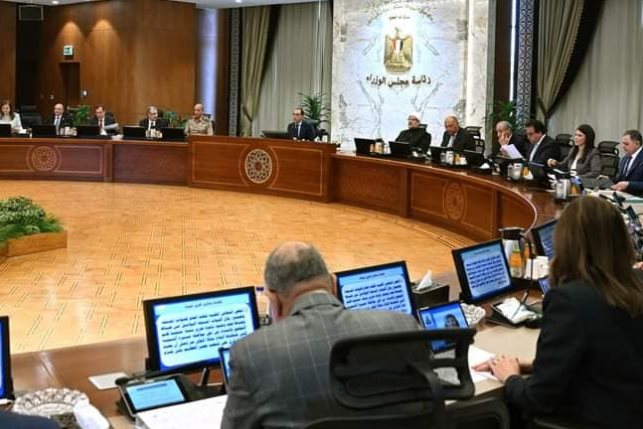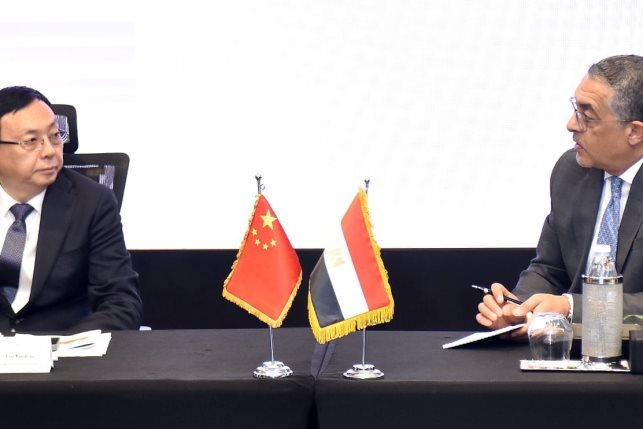Egypt Emerges as Top Investment Destination Amid Economic Reforms
Pro-business reforms drive economic growth in Egypt, attracting record foreign investment and positioning the country as a leading destination for investors.
 Egypt's Strategic Reforms Set to Transform Country into Economic Powerhouse - Photo illustrated by Mohamed Zain/Business Today
Egypt's Strategic Reforms Set to Transform Country into Economic Powerhouse - Photo illustrated by Mohamed Zain/Business Today
Egypt has been making significant strides in attracting foreign investment in recent years. With its rich history, cultural heritage, and a strategic location linking Europe, Asia, and Africa, the country offers investors numerous opportunities to tap into a rapidly growing market. The Egyptian government has been working tirelessly to create a business-friendly environment that encourages foreign investment, and these efforts have paid off in recent years.
The Egyptian economy has seen steady growth, with a 3.6% GDP growth rate in 2020, despite the COVID-19 pandemic's impact on the global economy. This growth is driven by sectors such as construction, manufacturing, and services, which have seen increased investment in recent years. The government has been actively promoting these sectors, recognizing their potential for growth and job creation.
THRUSTING ECONOMIC REFORMS:
One of the key factors driving investment in Egypt is the government's commitment to economic reform. The country launched an ambitious economic reform program in 2016 aimed at boosting growth, reducing public debt, and creating jobs. The program included measures such as reducing subsidies, implementing value-added taxes, and liberalizing the exchange rate. These reforms have helped to stabilize the economy and create a more predictable business environment, which has in turn attracted foreign investors.
In addition to these economic reforms, the government has also taken steps to improve infrastructure and streamline bureaucratic processes, making it easier for businesses to operate in the country. Egypt has been investing heavily in infrastructure, with projects such as the expansion of the Suez Canal, the construction of new airports, and the development of new industrial zones. These infrastructure projects have created new opportunities for investors, and the government has been actively promoting these projects to foreign investors.
Egypt is making significant strides in improving its investment climate, with the government taking numerous steps to attract more foreign investment. The country's economic reforms, including the liberalization of the exchange rate and the implementation of a new investment law, have helped to create a more favorable environment for investors.
The government has also launched initiatives aimed at attracting specific sectors, such as tourism and renewable energy. Egypt has long been a popular destination for tourists, and the government has launched a number of initiatives to encourage more visitors to the country. This includes investing in new infrastructure such as airports and hotels, as well as promoting the country's cultural heritage and natural attractions.
HOISTING ECONOMIC FIELDS:
In the renewable energy sector, Egypt has made significant strides in recent years, with investments in wind and solar power projects. In 2019, the country inaugurated the world's largest solar park, the Benban Solar Park, which has a capacity of 1.8 GW and is expected to reduce carbon dioxide emissions by 2 million tons per year. The government has set an ambitious target of generating 20% of its electricity from renewable sources by 2022, and with several large-scale projects in the pipeline, it looks set to achieve this target.
Looking ahead, the Egyptian government is committed to continuing its efforts to attract foreign investment and promote economic growth. In 2021, it announced a new investment law aimed at further reducing bureaucratic obstacles and creating a more attractive investment environment. The law includes measures such as streamlining the procedures for obtaining investment licenses, offering incentives for investors, and creating a one-stop-shop for investors to facilitate their business operations.

The government has also prioritized the development of new sectors such as digital technology and e-commerce, recognizing the potential for growth in these areas. In 2021, it launched a new initiative called "Egypt Vision 2030," which aims to create a digital economy and promote entrepreneurship in the country. The initiative includes measures such as establishing technology parks, providing training and support for start-ups, and creating incentives for foreign investors in the technology sector.
Despite the progress made, Egypt still faces challenges in attracting investment. Bureaucratic obstacles, corruption, and security concerns remain major issues that need to be addressed. However, the government's commitment to economic reform, infrastructure development, and targeted sectoral initiatives show its determination to overcome these challenges and attract more investment to the country.
RESILIENCE DESPITE PANDEMIC:
The COVID-19 pandemic has undoubtedly had an impact on global investment flows, but Egypt's resilience and strong economic fundamentals have helped it weather the storm. As the world begins to recover from the pandemic, Egypt is well-positioned to take advantage of new investment opportunities.
Egypt has made significant economic reforms despite the challenges posed by the COVID-19 pandemic. The government's efforts have been praised by many international organizations for their positive impact on the country's economic growth.
One of the major reforms that Egypt implemented was the floatation of the Egyptian pound in November 2016. This allowed the currency to be determined by market forces and increased its competitiveness. The move helped to reduce the budget deficit and stabilize the economy.

Another important reform was the implementation of the Value-Added Tax (VAT) in September 2016. The VAT system has helped to increase tax revenues and improve the government's ability to provide public services and infrastructure.
Egypt has also taken steps to attract foreign investment by enacting several reforms to improve the business environment. In 2017, the government passed a new investment law that provided more incentives for investors, simplified procedures for establishing businesses, and provided more protection for intellectual property rights.
The country has also made significant progress in its energy sector, with several new projects being implemented to improve energy efficiency and expand renewable energy sources. This includes the establishment of the world's largest solar park in the Aswan region, which has a capacity of 1.8 gigawatts.
In addition to these reforms, the government has also implemented several measures to mitigate the impact of COVID-19 on the economy. This includes a comprehensive stimulus package that provided financial support to individuals and businesses affected by the pandemic.
The government has also implemented several measures to support the country's health system, including the construction of new hospitals and the expansion of existing facilities. This has helped to increase the country's capacity to deal with the pandemic and provide better healthcare to its citizens.
Furthermore, the government has prioritized the development of digital infrastructure, which has become more important than ever in the wake of the pandemic. This includes the launch of several initiatives to increase access to digital services and support the growth of the country's digital economy.
Despite the challenges posed by the pandemic, Egypt's economy has shown resilience and continued to grow. The country's GDP growth rate reached 5.6% in 2021, up from 3.6% in 2020, according to the Central Bank of Egypt.
Overall, Egypt's economic reforms have helped to create a more business-friendly environment, attract foreign investment, and promote sustainable economic growth. The government's efforts to mitigate the impact of COVID-19 on the economy have also been commendable, with measures aimed at supporting businesses and individuals, and investing in healthcare and digital infrastructure.
A GOLDEN LICENSE FOR INVESTORS?
Dr. Mohamed Maait, the Minister of Finance, confirmed that Egypt has become more attractive to foreign investment due to its promising and attractive opportunities, advanced infrastructure capable of meeting all the needs of investment and production activities, legislative environment, tax and customs incentives, and the government's stimulating efforts to enable the private sector, including the "State Policy Document" and "Golden License".
He pointed out that Egypt looks forward to increasing the investment of Korean companies, contributing to maximizing Egyptian production and export capabilities, and enhancing the partnership between the two countries. Korean company investments are a leading model in the electronics industry in the Egyptian market, playing a pivotal role in deepening the national industry, increasing the technological component in the industry, and providing new job opportunities.
The Minister added that the new "Export Support Program" is more encouraging for production and export sectors, with a budget allocation of 28.1 billion pounds in the new budget to support exporting companies. The government intends to start disbursing "Export Support" in the same year of export, starting from the next fiscal year, to provide the necessary cash liquidity to encourage production.
INDELIBLE COMMITMENT:
Another critical aspect of Egypt's business-friendly environment is the country's commitment to attracting foreign investment. Egypt offers a range of incentives to foreign investors, including tax exemptions, simplified procedures for obtaining permits and licenses, and access to a large and growing market. The country has also established a one-stop-shop investment center that provides investors with all the necessary information and support to set up businesses quickly and efficiently.
Furthermore, Egypt has invested heavily in developing its infrastructure, including ports, airports, and road networks. This has made the country an attractive destination for investors looking to set up manufacturing facilities or expand their existing operations. In addition, the government has implemented several reforms to improve the labor market, such as introducing a new minimum wage and improving the social protection system, which has contributed to improving the country's overall business environment.
In conclusion, Egypt's efforts to create a more business-friendly environment have yielded positive results, with the country emerging as an attractive destination for investors. The government's commitment to implementing economic reforms, attracting foreign investment, and developing its infrastructure has contributed to improving the ease of doing business in the country. As Egypt continues to implement measures to improve the business environment, the country is expected to attract even more investment and achieve sustained economic growth in the years to come.





